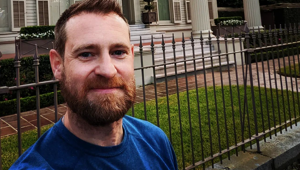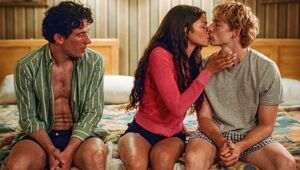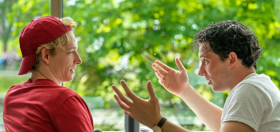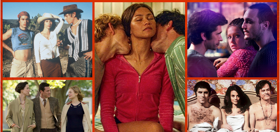
Josephine Decker and Sarah Gubbins presided over one of the most talked-about films of the 2020 Sundance festival.
Texas-born Decker established herself as an actress and performance artist before moving into directing. Her directorial efforts Butter on the Latch and Thou Wast Mild and Lovely earned positive critical acclaim as a director on the rise. Her third feature, Madeline’s Madeline, played the Sundance Film Festival in 2018.
For Gubbins, the out-lesbian writer, Shirley marks both her first feature film as a screenwriter, and her first foray into the world of Sundance. She decided to adapt the original novel by writer Susan Scarf Merrell as a passion project. Gubbins first earned notice by Hollywood when she created the cult TV comedy I Love Dick.
Shirley fictionalizes a chapter in the life of writer Shirley Jackson, the author of horror stories The Haunting of Hill House, The Hangsaman and The Lottery among other genre classics. The film portrays Jackson as a depressive, mentally unstable genius at constant odds with her professor husband. When the pair take in a young couple, Fred and Rose, Shirley’s passions flare for the younger woman. The for then spend months locked in battle of wits and shifting alliances, as the household tension drives Jackson to write a new novel. Elizabeth Moss stars as Shirley, Michael Stuhlbarg as Stanley, Logan Lerman as Fred and Odessa Young as Rose.
How about we take this to the next level?
Our newsletter is like a refreshing cocktail (or mocktail) of LGBTQ+ entertainment and pop culture, served up with a side of eye-candy.
Shirley finally arrives on Hulu and other VOD services June 5. Queerty was lucky to score time with Gubbins and Decker just after the Sundance premiere of the film.
Sarah, I know you wrote the script, and I know you’re queer…
SG: It’s true. I enjoy it.
A good thing to be. And this is your first feature. How did the novel come to you? What made you want to it as your first screenplay?
SG: It came to me through a friend who lives out in Sag Harbor, near where [Susan] lives. She was just finishing the novel, and my friend knew I was looking for material. I’ve always been a Shirley Jackson fan, and obviously was a big fan of her short stories. So it emerged from there.

So how did the two of you get hooked up?
SG: I was looking for something to do with our producer, Sue Naegle. She was interested in developing something I wrote. We found Shirley, and once the script was written, we were looking for the most inspired artist we could come across. It was a long search, but Josephine Decker dropped in our path.
So what spoke to you about the script, Josephine?
JD: So many things. I’d gotten obsessed with Shirley Jackson’s writing, and the idea of making a work about a female literary figure who had, to some degree—I guess it’s not that she’s overlooked. Everyone reads “The Lottery” in school, which is awesome. But I don’t think everyone knows her name, the way people do with other horror writers. It’s funny to say to people “She wrote The Haunting of Hill House, which is on Netflix.” And they’re like “She did?” So somehow her work isn’t associated with her name. So bringing attention to her name feels like an amazing thing to do.
SG: Yeah.
JD: But outside of that, the script was insanely good. I feel like two women write incredibly complex, messy, credible characters: Shirley Jackson, and Sarah Gubbins.
[Laughter]
I mean I loved I Love Dick so much, and I loved what she did with Chris [Kraus, co-creator] on that show. And I felt like there was the possibility with Shirley to show this person who is barely holding her life together, but in some ways is the Goddess of the World. She can do anything. And I think Elizabeth Moss plays her so well in the film because she gets that. She gets all of her power and all of her tragic vulnerabilities. And I don’t want to call her “tragic,” because she’s an incredible person. But she had it rough.

She had it rough. Dead at 48?
JD: Yes. She had an incredibly abusive relationship with her husband and her mother. But also, she wrote about her kids in this way that was hilarious.
SG: Yes, exactly.
JD: Then there were all these other details of the script that were really fun. If I hadn’t been a filmmaker, I’d have been really interested in ethnomusicology. Stanley, her husband, is not an ethnomusicologist, but he’s obsessed with music. And in the film, there is so much of this music that he’s teaching in his class. The blues, ballads—teaching kids storytelling through music. That’s something I’m really passionate about too. So there were enough synchronicities. There were so many things I loved in this world.
Wonderful.
JD: I also really related to Rose. There’s something about that character that I really identified with. I think I’m a pretty shy person, and something about being opened up, or invited to open up that I receive from filmmaking that is really healthy for me. I saw that was the trajectory that we were sending our protagonist on.
It fits well with your filmography. You’re someone who makes films about women, and relationships among women. This one reminds me—and this is interesting because it’s also a queer parallel—but it reminds me of Who’s Afraid of Virginia Woolf.
JD: Mmmhmm.

Two couples living together. Messy. Drinking. Gaslighting. Flirting. Was that a conscious influence?
JD: I think it’s fair to say Sarah is obsessed with Virginia Woolf.
[Laughter]
SG: Yeah, absolutely. Partially that comes from being in the 40s, being a faculty couple, being on the outside of that. Immediately when I read the novel I thought it was another musing of Who’s Afraid of Virigina Woolf. Which felt right to their relationship, that they were in performance to each other. They would quote Shakespeare to one another. Their house would be a literal maze of books. They had over 20,000 books.
Wow.
SG: It was amazing. So the idea of paying homage to that was exciting.
It’s there on the screen. And like Virginia Woolf, I kept asking myself are these people that awful? I was totally captivated by them. And I kept thinking specifically about George and Martha, a couple desperately in love with each other, and who have no idea how to show that to one another in a healthy way. It really felt like Stanley and Shirley are from the same mold: driving each other nuts on purpose because that’s all they can do.
JD: Mmmhmm.
You’ve already mentioned Elizabeth, and she gives a tremendous performance here. I found it fascinating the way you introduce her in the film. Rose sees her through this crowd of people, and it feels like seeing an animal in the zoo or out in the woods through trees. What was your reason for designing the sequence that way?
JD: I think that was mostly because we enter the film through Rose. It’s the beginning of this story, and she’s just getting to know this woman whom she’s only known through her writing. So it made sense to say in Rose’s perspective. I really wanted to bind the film, and let the audience know, we’re seeing the film through another person’s eyes. Obviously, as the film goes on, we also want to see inside Shirley’s head.

Yes.
JD: That was one of the most interesting and challenging things about the script.
SG: Yes.
JD: The challenge of adjusting perspective, or having a duel perspective. We’re still outside of Shirley but we’re also inside of Shirley by the end. So I think it was mostly trying to give the feeling of the desire to know Shirley. I think that’s important for an audience. You want a desire to see more.
And with all the layers, you never really know what she’s going to do. One thing we need to discuss is that in the film there is a lot of lesbian—not just subtext, but straight up text—in the Rose/Shirley relationship. It’s quite erotic at times. That’s also a parallel with Shirley’s writing. The Haunting has this amazing lesbian relationship.
SG: Honestly, it’s in many of her novels. There’s a lesbian relationship in Hangasman. Whether or not a lesbian relationship needs to be explicitly…what’s the word..?
JD: Consummated?
SG: Yeah. And queer longing is present in her work. All over.
And in a sense, your film isn’t just about Shirley Jackson. It exists almost like a work by Shirley Jackson, in that it taps a lot of her familiar tropes. Along those same lines though, lesbianism in her work is often something scary. It keeps the reader off-balance. For the two of you, writing a queer story, how do you look at the characterization of lesbianism in Shirley Jackson’s work, and how does that affect your creative choices in the film?
SG: Well I would argue that I don’t think lesbianism is scary in her work at all. Her work is all romances between two women. It’s interesting that you contextualize or frame it as “lesbian” or “not lesbian.” I’ve always seen her work as divided consciousness: the longing for another part of yourself to feel integrated. Shirley in real life was both a misanthropic, miserable, hilarious, messy person. And she was also a great baker. A committed mother. A great writer. But the protagonists in her work, which are usually the misanthrope or the perfect housewife were two sides of her that were difficult to reconcile. I think there’s a longing there to integrate, and that’s why the relationships are erotic.

Yes.
SG: An erotic relationship is a consummation of two beings. All the characters she’s writing about—women friends on opposite polls—are not just a desire for physical lesbian consummation. For me, much more strongly, there is a desire for the consummation of two emotional worlds. I feel like those relationships are portrayed beautifully. We Have Always Lived in a Castle has two sisters, but they rely on each other, they need each other. The perfect one needs the other messy destructive one. The messy one brings warmth and generosity from her capable sister. I think there was a fear of lesbianism at the time, obviously.
Very much so.
SG: But I don’t feel that in her work.
JD: In some ways she’s such a contemporary voice in the ways she falls under a queer umbrella.
How so?
JD: I think her desires were varying. She writes very directly about being seduced by Dylan Thomas and finding him this object of desire. I believe that too. I think in some ways she had a great openness about where her desires lived, in part, because the desire was so terrifying. So I don’t think she finds lesbianism creepy or anything to be suppressed. But its the idea of intimacy and how to find intimacy and having sexuality. To me, one of the most touching scenes in the movie between the women is the dress scene, when Rose is able to understand Shirley’s discomfort and shame with her body.
Related: She found OJ, the Rodney King riots & she’s queer. ‘Whirlybird”s Matt Yoka wants to introduce you.
Yeah.
JD: I don’t think that’s an erotic love between them in that moment, but that is part of loving someone. So I think it’s deliciously complicated. Obviously, the character of Toni in Hangsaman is this kind of noble, stone-cold butch who is elusive in her affections.
[laughter]
JD: Shirley had a great sense of humor about those things. And we did talk quite a bit about whether or not that was even a character, or is that part of Shirley’s self? Is that a self she wishes she could be?

The end of the film—I’ll not give it away here—left me wondering what happens to one character specifically. Viewers will know who I mean. For the two of you, what happens the day after?
JD: Not to ignore your question, but what I loved about Hangsaman—the main character, Natalie has this relationship with Toni. One of Shirley’s biographers was so funny, she said nobody picked up on the fact that Toni was obviously an imaginary friend. And I was like really? It’s not how I read the book at all. To me, Toni is real until she’s not real. It doesn’t matter what happens the day after because [CENSORED] is only there to serve Shirley’s wishes. What matters the next day is Shirley.
Interesting.
JD: And I think what happens next to Shirley that night is that she has great sex with Stanley. She feels great for 10 hours. They drink a lot. And the next morning, she wakes up and has to start her next book. Which is real horror.
SG: That is about the worst day of your life.
On that same question. What’s next for you?
SG: I’m in the middle of a bunch of projects. Another feature, and television projects. That’s all I can say.
JD: I’m directing a movie called The Sky is Everywhere. It’s an adaptation of a YA novel. I’m really excited to shoot this summer. But I’m interested in TV, and writing something that I’d like to turn into a series. And it’s too early to say what it is.
NEON will release Shirley on Hulu, VOD, Virtual Cinemas and participating Drive-Ins Friday, June 5th, 2020.


















